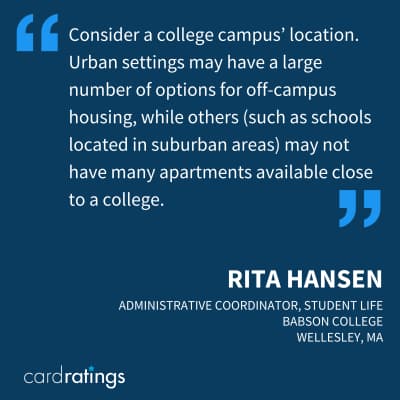ON THIS PAGE
- How to choose college housing
- Why your credit score – and your parents’ – affects college housing options
- Best states for college students living off campus – What you can save
- Does where you live in college matter long-term?
- What college students can do to improve their credit score
- Methodology: Measuring the Best States for Living Off Campus
Should you live off campus during college?
Along with all the academic challenges you’ll face, the choice of whether to live on or off campus can be one of the toughest. It can also have a huge long-term impact.
Key takeaways
- Living off campus will save you money in most states, up to $7,000 per year in the state with the highest potential savings
- Living situations have been shown to directly impact academic performance during college
- Learn what to do so your credit history doesn’t limit your options
For some, living on campus is a chance to take the deepest possible dive into the college experience. This not only means embracing the social possibilities of living amongst your peers, but also the convenience of easy access to classes, labs, libraries and other facilities.
Others, though, prefer to get away from the hubbub at the end of the school day. Living off campus may represent an opportunity to cut down on distractions after classes. In some cases, it also may represent an opportunity to save money.
A new study by CardRatings.com finds that in the typical state you can save about $2,400 a year by living off campus. In the state with the highest potential savings, you could knock more than $7,000 a year off your college costs by moving out of the dorms.
However, those savings may not be available to all students. Living off campus may not be an option unless you or your parents have a strong credit record.
In the end, the most important thing to consider when deciding to live on or off campus is which would be better for your academic performance. That impact could make a difference for decades to come, which most likely would blow any short-term savings you might get from a different living arrangement during your college years.
How to choose college housing
Before looking at a financial comparison of living on vs. off campus, it’s important to recognize that this decision shouldn’t primarily be about dollars and cents. What matters more is your academic performance.
When it comes to academics, there are advantages and disadvantages to living on or off campus.

As Rita Hansen, the administrative coordinator of student life at Babson College points out, “Students who anticipate that they will be collaborating on group presentations and group projects may find it most convenient to live on campus, especially during their freshman year. Those attending schools where winter weather can impact commute times may value the convenience of walking to classes rather than enduring a long commute, particularly when working late hours at school.”
The impact Hansen describes depends greatly on where you go to school.
“Consider a college campus’ location,” she advises. “Urban settings may have a large number of options for off-campus housing, while others (such as schools located in suburban areas) may not have many apartments available close to a college. Think realistically about the time involved shopping for food, cooking, and cleaning up; assess whether or not a student can comfortably juggle that along with academic and extracurricular activities.”
This isn’t an all-or-nothing decision. The right choice can depend on where you are in your college career. Hansen feels that “particularly during the first year, students living on-campus may find that it is easier to make connections with other students and faculty. Shared study habits, communal dining, and convenient socializing can all help a given class congeal.”
In short, outside of any financial considerations, the impact of whether to live on or off campus depends largely on your study and social habits. It also depends on the options available where you attend college.
Plus, there’s one other big factor. The option of living off campus might not even be available unless you have good credit.
Why your credit score – and your parents’ – affects college housing options
In many parts of the country, landlords now routinely check the credit history of potential tenants.
Landlords want to determine what your credit history says about the likelihood that you’ll pay your bills. In particular, if you have an eviction on your record it could be a red flag for future landlords.
Of course, given the brief credit history and limited financial means of most college students, your record might not be enough to win a landlord’s approval. What may make the difference is if you have a parent who’s willing to co-sign the lease.
In that case, your parents’ credit history would come into play.
Credit score could also make a difference if your college living arrangement requires you to have a car.
Although a handful of states restrict the use of credit reports in setting insurance rates, in most areas of the country you are likely to pay more if you don’t have a good credit history. If you need a car to commute to school, a higher car insurance rate could erode any cost advantage of living off campus.
If neither you nor your parents have an attractive credit history, you might be denied the option of living off campus because you can’t get a lease. Or, the cost of living off campus could be negated by higher car insurance rates.
This means that poor credit could rob you of some substantial savings – especially if you go to college in New England, as detailed in the section below.
Best states for college students living off campus – What you can save
When comparing college room and board charges with the cost of rent and groceries in the same state, CardRatings found the following to be the best states for saving money by moving off campus:
- Rhode Island. It’s not that food or rent are cheap in Rhode Island. The state’s average cost for each is above the national averages. It’s just that the median room and board charge for the state’s colleges is even pricier. In fact, at $15,332 the median annual room and board cost at colleges in Rhode Island is the highest of any state. The annual cost of sharing a two-bedroom apartment with one other tenant plus groceries during the school year would come to just $8,146, a savings of $7,186.
- Connecticut. This is another expensive state whether you pay for room and board through the typical college or arrange for it privately, but there’s a clear advantage to doing it privately. The median room and board charge at the state’s colleges is $13,948, compared with $8,953 for rent and groceries purchased independently. That’s a potential savings of $4,995.
- Massachusetts. The median on-campus room and board charge of $15,070 is second only to Rhode Island’s. Even though rents and groceries in the state are more expensive than the national average, arranging for them privately would cost $10,517, a savings of $4,553.
- Pennsylvania. The median room and board charge at colleges in Pennsylvania is $11,902, but you could rent and buy groceries for $7,440 and save $4,462.
- Vermont. The New England pattern continues in Vermont: it’s not cheap no matter how you approach it, but the median room and board charge of $12,900 is $4,447 more expensive than the cost of rent and groceries off campus.
- Ohio. You would typically pay $10,590 for room and board at an Ohio college, but you could save $4,211 off campus.
- Indiana. The median room and board charge of $10,500 in Indiana is $4,083 more than the estimated cost of living off campus.
- New Hampshire. The fifth and final New England state to make this list, New Hampshire colleges have a median room and board charge of $12,846. That’s $3,764 more than the estimated off-campus cost.
- West Virginia. This state is a little different from all the others on this list because it’s median on-campus room and board charge of $9,700 is actually below the typical state’s. However, rent and groceries are even cheaper in the state, so you could save $3,761 by moving off campus.
- North Carolina. This state’s median room and board charge of $10,422 is $3,746 more than the estimated cost of living off campus.
In just two states – Mississippi and Hawaii – did CardRatings.com find that it’s actually cheaper to live on campus than off.
With that said, though, the true financial impact of whether you live on or off campus might not be fully realized for many years.
Does where you live in college matter long-term?
Some students do better academically living on campus, while others thrive once they move out of the dorms.
Recognizing which is likely to be better for you could have an impact throughout your career.
A 2018 study by the National Association of Colleges and Employers found that 73.3% of employers screen their job candidates by GPA. In some industries that percentage was 100%.
If your college living arrangements affect your academic performance, it could impact your ability to launch a career in your chosen field. This could determine your earnings over your entire career.
In an April-May 2021 survey of nearly 900 18-to-24-year-olds, people were asked which living arrangement would be best for their academic performance in college. The choices were:
- Dormitory or other on-campus housing
- An off-campus apartment or house
- Living at home with parents or other relatives
- Other
Among those who expressed a specific preference (i.e., those who did not chose “other”) 58.6% chose some form of off-campus living. This included 40% who preferred an off-campus apartment or house and 18.6% who preferred to live at home with parents or other relatives.
These preferences for off-campus living were even higher among female survey respondents. 61.7% of female respondents said they would do better academically if they lived off campus. This included 19% who preferred to live at home with parents or relatives, and 42.7% who preferred to live in an off-campus apartment or house.
However, even those numbers leave a substantial percentage of students who feel living on campus would be best for them academically. In the end, this is a personal choice. You must decide what is best for you.
What college students can do to improve their credit score
In order to even have the choice of living off campus, you need good enough credit to meet a landlord’s scrutiny.
If you think you might want to explore living off campus at some point in your college career, here are some ways you – and your parents – can prepare by getting your credit reports in shape to pass muster with landlords.
- Start using credit responsibly. It can be tough for a young person to establish a credit history. Opening a student credit card account and can be a way to get in the game.
- Address any issues on your credit report. Take a look at what that report says about you. If there are any mistakes or past problems you can resolve, get it taken care of as soon as possible.
- Be careful about opening new accounts shortly before applying for a lease. Adding new lines of credit can make you seem like more of a risk, so be careful about when you do this.
- Don’t close any old accounts just yet. It can surprise people to find that closing an account can actually make you appear to be more of a credit risk. However, if you have a credit balance outstanding on any of your accounts, closing an account increases the percentage of your available credit that’s being utilized – and that can count against your credit score.
- Pay down outstanding credit balances. While closing a credit account can count against you, paying down balances on existing accounts is a good thing because it reduces your credit utilization percentage.
In the end, the right choice of living on or off campus depends on your individual habits and preferences, and on where you go to college. However, in order to even have a choice, it may be necessary to get your credit score in shape.
Methodology: Measuring the Best States for Living Off Campus
To estimate the potential financial benefit of moving off campus, CardRatings.com looked at the following for each of the 50 states plus the District of Columbia:
- The median room and board charge for a school year at each state’s colleges, from the National Center for Education Statistics.
- US Census Bureau data for the median rent on a two-bedroom apartment, assuming the cost is split two ways.
- Estimated grocery costs for an eight-month school year, based on the US Department of Agriculture “thrifty plan” estimates of food costs and adjusted for the relative cost of groceries in each state using cost of living data from the Council for Community and Economic Research.
The table below shows each state’s on and off campus food and board costs, plus the difference between the two:
Median On-Campus Room
and Board Charge
Estimated Off-Campus Rent
and Groceries Expense
Potential Off-Campus Savings
Savings Rank
Alabama
$7,925
$6,050
$1,875
34
Alaska
$10,440
$9,209
$1,231
43
Arizona
$10,534
$7,947
$2,587
24
Arkansas
$7,600
$5,613
$1,987
32
California
$13,711
$11,630
$2,081
31
Colorado
$11,168
$9,760
$1,408
41
Connecticut
$13,948
$8,953
$4,995
2
Delaware
$11,984
$8,424
$3,560
12
District of Columbia
$14,928
$11,262
$3,666
11
Florida
$10,500
$9,023
$1,477
40
Georgia
$10,314
$7,396
$2,918
21
Hawaii
$8,248
$12,912
-$4,664
51
Idaho
$7,680
$6,441
$1,239
42
Illinois
$10,510
$7,546
$2,964
19
Indiana
$10,500
$6,417
$4,083
7
Iowa
$8,820
$6,365
$2,455
25
Kansas
$8,110
$6,402
$1,708
36
Kentucky
$9,300
$5,892
$3,408
13
Louisiana
$9,894
$6,617
$3,277
14
Maine
$9,902
$6,920
$2,982
17
Maryland
$12,350
$10,241
$2,109
30
Massachusetts
$15,070
$10,517
$4,553
3
Michigan
$10,068
$6,827
$3,241
15
Minnesota
$8,960
$7,981
$979
45
Mississippi
$5,000
$5,810
-$810
50
Missouri
$8,695
$6,405
$2,290
27
Montana
$8,184
$6,550
$1,634
37
Nebraska
$8,850
$6,540
$2,310
26
Nevada
$10,892
$8,194
$2,698
23
New Hampshire
$12,846
$9,082
$3,764
8
New Jersey
$11,788
$10,236
$1,552
39
New Mexico
$8,126
$6,339
$1,787
35
New York
$12,834
$9,759
$3,075
16
North Carolina
$10,422
$6,676
$3,746
10
North Dakota
$7,268
$6,393
$875
46
Ohio
$10,590
$6,379
$4,211
6
Oklahoma
$7,748
$6,135
$1,613
38
Oregon
$11,650
$8,681
$2,969
18
Pennsylvania
$11,902
$7,440
$4,462
4
Rhode Island
$15,332
$8,146
$7,186
1
Sourth Carolina
$9,500
$6,796
$2,704
22
South Dakota
$8,146
$6,216
$1,930
33
Tennessee
$8,724
$6,565
$2,159
29
Texas
$8,724
$7,859
$865
47
Utah
$7,784
$7,734
$50
49
Vermont
$12,900
$8,453
$4,447
5
Virginia
$11,450
$8,508
$2,942
20
Washington
$10,876
$9,689
$1,187
44
West Virginia
$9,700
$5,939
$3,761
9
Wisconsin
$8,950
$6,749
$2,201
28
Wyoming
$7,108
$6,308
$800
48


